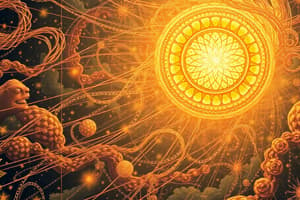Podcast
Questions and Answers
What is the definition of motion?
What is the definition of motion?
Motion is movement that changes an object's position.
What is the difference between speed and velocity?
What is the difference between speed and velocity?
Speed is the distance moved in an amount of time, while velocity is the speed and direction of a moving object.
What is the force that works against motion?
What is the force that works against motion?
Friction is the force that works against motion.
What happens to acceleration when mass increases?
What happens to acceleration when mass increases?
What is energy, and how can it be transferred?
What is energy, and how can it be transferred?
What are the different types of energy?
What are the different types of energy?
What is heat, and how is temperature measured?
What is heat, and how is temperature measured?
What is the relationship between force and acceleration?
What is the relationship between force and acceleration?
What is the term for the transfer of heat energy through liquids or gases?
What is the term for the transfer of heat energy through liquids or gases?
What is the material that does not transfer heat energy easily?
What is the material that does not transfer heat energy easily?
In which medium does sound travel the fastest?
In which medium does sound travel the fastest?
What is the term for the distance between sound waves?
What is the term for the distance between sound waves?
What type of materials allow light to pass through them?
What type of materials allow light to pass through them?
What happens when light waves bounce off a surface?
What happens when light waves bounce off a surface?
What is the flow of electrical charges through a circuit called?
What is the flow of electrical charges through a circuit called?
What is the purpose of a fuse in a circuit?
What is the purpose of a fuse in a circuit?
Flashcards are hidden until you start studying
Study Notes
Forces and Motion
- Position is the location of an object
- Motion is movement that changes an object's position
- Speed is the distance moved in an amount of time
- Velocity is the speed and direction of a moving object
- Inertia is the tendency of an object in motion to stay in motion or an object at rest to stay at rest
- A force is a push or pull
- Acceleration is a change in speed of an object
- Friction is the force that works against motion
- Gravity is the force that pulls objects down toward Earth
Changing Motion
- Newton is the unit used to measure force
- Balanced forces are forces that are equal in size with opposite directions
- Unbalanced forces are forces that are not equal in size with opposite directions
- When mass increases, acceleration decreases
- When force increases, acceleration increases
Work and Energy
- Work is done when force is used to move an object a distance
- Energy is the ability to do work
- Potential energy is stored energy
- Kinetic energy is the energy of motion (movement)
- Energy can be transferred from one object to another
- Energy can be transformed from one form to another
- Types of energy: chemical, light, thermal, electrical, mechanical, and nuclear
Heat
- Heat is the flow of thermal energy from one object to another
- Temperature measures the thermal energy of the particles in a substance
- Thermometers measure temperature using liquid mercury inside
- Conduction is heat transfer between two objects that are touching
- Convection is heat transfer through liquids or gases
- Radiation is heat transfer through space (no matter is needed)
- Insulators are materials that do not transfer heat energy easily (cotton, plastic)
- Conductors are materials that transfer heat energy easily (metal)
Sound
- Sound travels in solids, liquids, and gases
- Sound cannot travel through outer space since there is no matter in space
- Wavelength is the distance between waves
- Frequency affects pitch
- Amplitude affects volume
- Pitch is the highness or lowness of sound
- Volume is the loudness of a sound
Light
- Light travels in waves
- Transparent materials (glass) allow light to pass through
- Translucent materials scatter light in different directions
- Opaque materials block light completely
- Colors of visible light: ROYGBIV (Red, Orange, Yellow, Green, Blue, Indigo, Violet)
- Red has the longest wavelength, Violet has the shortest wavelength
- Reflection is when light waves bounce off a surface
- Refraction is when light rays bend when moving from one material to another
Electricity
- Electrical charges can be negative or positive
- When a lot of charges build up, it's known as static electricity
- A circuit is a path where electric current flows
- The flow of electrical charges through a circuit is called electric current
- Electrical conductors are the same as heat conductors (metal)
-
- and - charges attract each other
-
- and - charges repel each other
-
- and + charges repel each other
- Fuses can only be used one time and break the connection when there is too much electricity/heat
Studying That Suits You
Use AI to generate personalized quizzes and flashcards to suit your learning preferences.




